复旦研究生英语Unit Seven
研究生英语阅读翻译下unit7

New varieties of rice and other crops, resistant to insects and disease ,will have replaced those cultivated today. Farmers will no longer lose substantial proportions of the less developed countries. Health benefits will also come from plants genetically engineered to be more balanced nutritionally than those that have evolved through natural selection or been bred by traditional methods.
the margin of error, are correspondingly
reduced.
翻译:从一种植物到另一种植物,生物技术允许单个基
因精确地移动。很容易了解到,一个基因在其新的环境 将如何进行工作的。意想不到的可能的结果以及误差是 相应地在减少。 •疑问:The likelihood of unexpected consequences, and the margin of error, are correspondingly reduced. •这句话怎么翻译? unexpected consequences, the margin
如果研究和发展被允许继续下去,所有产品 都将会增值。
疑问:the products will be there for all to appreciate— —是指产品会增值还是指产品会被人们所欣赏?
研究生新阶英语阅读 Unit 7 原文
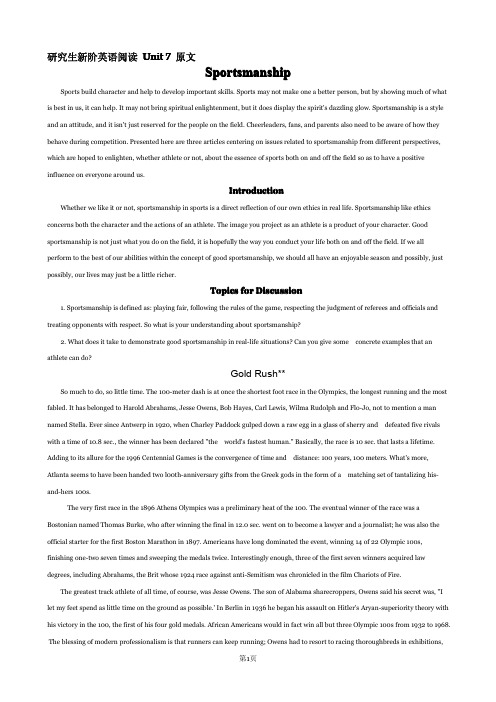
研究生新阶英语阅读Unit7原文SportsmanshipSports build character and help to develop important skills.Sports may not make one a better person,but by showing much of what is best in us,it can help.It may not bring spiritual enlightenment,but it does display the spirit's dazzling glow.Sportsmanship is a style and an attitude,and it isn't just reserved for the people on the field.Cheerleaders,fans,and parents also need to be aware of how they behave during competition.Presented here are three articles centering on issues related to sportsmanship from different perspectives, which are hoped to enlighten,whether athlete or not,about the essence of sports both on and off the field so as to have a positive influence on everyone around us.IntroductionWhether we like it or not,sportsmanship in sports is a direct reflection of our own ethics in real life.Sportsmanship like ethics concerns both the character and the actions of an athlete.The image you project as an athlete is a product of your character.Good sportsmanship is not just what you do on the field,it is hopefully the way you conduct your life both on and off the field.If we all perform to the best of our abilities within the concept of good sportsmanship,we should all have an enjoyable season and possibly,just possibly,our lives may just be a little richer.Topics for Discussion1.Sportsmanship is defined as:playing fair,following the rules of the game,respecting the judgment of referees and officials and treating opponents with respect.So what is your understanding about sportsmanship?2.What does it take to demonstrate good sportsmanship in real-life situations?Can you give some concrete examples that an athlete can do?Gold Rush**So much to do,so little time.The100-meter dash is at once the shortest foot race in the Olympics,the longest running and the most fabled.It has belonged to Harold Abrahams,Jesse Owens,Bob Hayes,Carl Lewis,Wilma Rudolph and Flo-Jo,not to mention a man named Stella.Ever since Antwerp in1920,when Charley Paddock gulped down a raw egg in a glass of sherry and defeated five rivals with a time of10.8sec.,the winner has been declared"the world's fastest human."Basically,the race is10sec.that lasts a lifetime. Adding to its allure for the1996Centennial Games is the convergence of time and distance:100years,100meters.What's more, Atlanta seems to have been handed two l00th-anniversary gifts from the Greek gods in the form of a matching set of tantalizing his-and-hers100s.The very first race in the1896Athens Olympics was a preliminary heat of the100.The eventual winner of the race was a Bostonian named Thomas Burke,who after winning the final in12.0sec.went on to become a lawyer and a journalist;he was also the official starter for the first Boston Marathon in1897.Americans have long dominated the event,winning14of22Olympic100s, finishing one-two seven times and sweeping the medals twice.Interestingly enough,three of the first seven winners acquired law degrees,including Abrahams,the Brit whose1924race against anti-Semitism was chronicled in the film Chariots of Fire.The greatest track athlete of all time,of course,was Jesse Owens.The son of Alabama sharecroppers,Owens said his secret was,"I let my feet spend as little time on the ground as possible.'In Berlin in1936he began his assault on Hitler's Aryan-superiority theory with his victory in the100,the first of his four gold medals.African Americans would in fact win all but three Olympic100s from1932to1968. The blessing of modern professionalism is that runners can keep running;Owens had to resort to racing thoroughbreds in exhibitions,and the1964and1968winners,Bob Hayes and Jim Hines,turned to pro football for their livelihood.The first of Carl Lewis'eight gold medals came in the100in the1984Los Angeles Games.When his father died in1987,Lewis placed that medal in his coffin and said,"I want you to have this because it was your favorite event."Seeing his mother's surprise, Lewis said,"Don't worry,I'll get another one."He did,but only as a consequence of the greatest scandal in Olympic history:the1988 100m.Canadian sprinter Ben Johnson,whose motto was"When the gun goes off,the race is over,"flashed across the finish line in Seoul in a world-record time of9.79sec.Unfortunately,when his urine.test came in it was all over for Johnson.Lewis,the second-place finisher,was awarded the gold.The women of the100also have a rich history,dating back to Amsterdam in1928,when a16-year-old from Riverdale,Illinois,Betty Robinson,won the race—the very first track event for women—with a time of12.2sec.What made Robinson's victory so remarkable was that the Olympics were only her fourth track meet.The1932winner was Stanislawa Walasiewicz of Poland,who was better known in the U.S.,her second country,as Stella Walsh.According to an official,Walsh ran"with long,manlike strides."The reason for that became clear some48years later when Walsh,an innocent bystander,was killed in a robbery attempt in Cleveland.An autopsy revealed she was actually a man.There was no mistaking the sex of the great Wilma Rudolph,"who was a young mother when she won the100,the first of her three gold medals,at the Rome Olympics in1960.She in turn passed the baton to another Tennessee State runner,Wyomia Tyus,who won in both1964and1968to become the first runner,man or woman,to win an Olympic sprint twice.African-American women have also won the past three100s:Evelyn Ashford in1984,the flamboyant Florence Griffith-Joyner in1988and Gail Devers in1992.When Harold Abrahams went to the starting line in Paris in1924,his coach,Sam Mussabini,told him,"Only think of two things—the report of the pistol and the tape.When you hear the one,just run like hell till you break the other."There is a little more to the100than that.Even though it's over in a heartbeat,the race has three distinct stages:start,acceleration and deceleration.The start itself has two components,the reaction to the gun and the angle of takeoff.Says Brigham Young University track coach Willard Hirschi: "If you come up too quickly,you lose acceleration.If you lean too far,you can stumble.It is like an airplane taking off—there is an ideal angle at which you can generate speed."To get up to speed—about23m.p.h.at their fastest—runners have to be careful not to try too hard.As Hirschi says,"Speed and effort are not synonymous."Then,once they reach top speed at40m,the key becomes economy of motion."That's why Carl Lewis always looked like he was eating everyone for lunch,"says Hirschi."He was slowing down the least."Levis,now35,was unable to qualify for the100in Atlanta,but the finals will still have tremendous wattage on evening of July27. Among the contestants will be Barcelona's prickly champ,Linford Christie of Britain;Ato Boldon of Trinidad by way of UCLA;Canada's two heirs to Ben Johnson,world champion Donovan Bailey and Bruny Surin;and Frankie Fredericks of Namibia and Brigham Young University.Fredericks,who is coached by Hirschi and is employed on the business side of a Namibian uranium mine,has been positively radioactive of late,running the second-and third-fastest100s in history and then ending Michael Johnson's21-race winning streak in the200.There are also the three sprinters who will be trying to keep the U.S.from losing its first Olympic100on its own soil:Dennis Mitchell,Mike Marsh and Jon Drummond,a preacher's son who still sings with the gospel group Kirk Franklin and the Family.While the men's100has a global feel to it,the women's dash could be a hometown celebration for pre-race favorite Gwen Torrence,who grew up in nearby Decatur,Georgia,and lives in Livonia."God sent[the Olympics]here to make up for what happened to me in1992,"Torrence has said,referring to the Barcelona100,when she finished fourth and then accused two of the three medalists of drug use.All three of those medalists—Devers,Juliet Cuthbert of Jamaica and Irina Privalova of Russia—will be back,which shouldmake for some interesting stares as the women line up for the start."You can just imagine what the air of the Olympics is going to be when that100begins,"says Mitchell,who would love to redeem himself after finishing third to Christie and Fredericks in Barcelona."It's going to be just crazy.I don't even know if I can handle it,and I'm one of the athletes competing."All that anticipation over something takes just10seconds.All that importance is attached to just six grams of gold.。
研究生英语精读UNIT7ON HUMAN NATURE
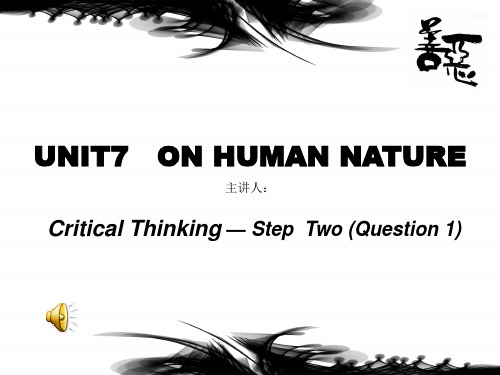
Suggestion:
First, Understanding. Second, Self-control. Third, By thinking small.
THANKS FOR YOUR ATTENTION!
---- THE SIXTH TEAM
Second, Байду номын сангаасelf-control.
People use their self-control to break bad habits and establish good ones, and then life can run smoothly and successfully.
Third, By thinking small.
UNIT7 ON HUMAN NATURE
主讲人:
Critical Thinking — Step Two (Question 1)
CONTENTS:
O Question O View O Suggestion
Question :
As far as schools are concerned, what do you think they can do to make human nature closer to perfection?
As far as school concerned, we should start small.
For instance, by pulling together many small habits ,especially for avoiding temptations and problems, one can get a good human nature.
研究生英语综合教程UNIT7课文及翻译(含汉译英英译汉)
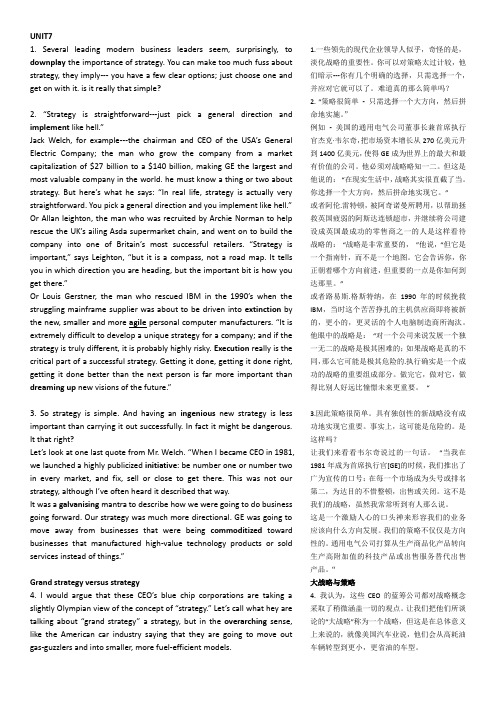
UNIT71. Several leading modern business leaders seem, surprisingly, to downplay the importance of strategy. You can make too much fuss about strategy, they imply--- you have a few clear options; just choose one and get on with it. is it really that simple?2. “Strategy is straightforward---just pick a general direction and implement like hell.”Jack Welch, for example---the chairman and CEO of the USA’s General Electric Company; the man who grow the company from a market capitalization of $27 billion to a $140 billion, making GE the largest and most valuable company in the world. he must know a thing or two about strategy. But here’s what he says: “In real life, strategy is actually very straightforward. You pick a general direction and you implement like hell.”Or Allan leighton, the man who was recruited by Archie Norman to help res cue the UK’s ailing Asda supermarket chain, and went on to build the company into one of Britain’s most successful retailers. “Strategy is important,” says Leighton, “but it is a compass, not a road map. It tells you in which direction you are heading, but the important bit is how you get there.”Or Louis Gerstner, the man who rescued IBM in the 1990’s when the struggling mainframe supplier was about to be driven into extinction by the new, smaller and more agile personal computer manufacturers. “It is extremely difficult to develop a unique strategy for a company; and if the strategy is truly different, it is probably highly risky. Execution really is the critical part of a successful strategy. Getting it done, getting it done right, getting it done better than the next person is far more important than dreaming up new visions of the future.”3. So strategy is simple. And having an ingenious new strategy is less important than carrying it out successfully. In fact it might be dangerous. It that right?Let’s look at one last quote from Mr. Welch. “When I became CEO in 1981, we launched a highly publicized initiative: be number one or number two in every market, and fix, sell or close to get there. This was not our strategy, although I’ve often heard it descri bed that way.It was a galvanising mantra to describe how we were going to do business going forward. Our strategy was much more directional. GE was going to move away from businesses that were being commoditized toward businesses that manufactured high-value technology products or sold services instead of things.”Grand strategy versus strategy4. I would argue that these CEO’s blue chip corporations are taking a slightly Olympian view of the concept of “strategy.” Let’s call what hey are talking about “grand strategy” a strategy, but in the overarching sense, like the American car industry saying that they are going to move out gas-guzzlers and into smaller, more fuel-efficient models. 1.一些领先的现代企业领导人似乎,奇怪的是,淡化战略的重要性。
研究生英语unit_7
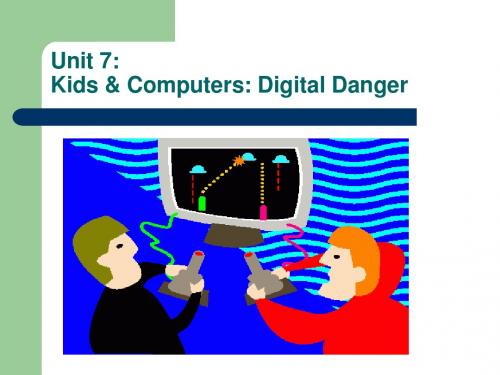
3. When kids sit down to play Monopoly…Contrast this board game scene with one…
Reading Comprehension
A: C B: DBCCD CBABA
Language Studies:A
Text Analysis: Devices for Developing It Giving Examples Making Contrast 1. a ball of Play-Doh…. A video game, on the other hand…. 2. a group of kids are playing a pickup game of soccer… Contrast that scene with the world of the Internet chat rooms…
…a generation raised more ….than… (para. 2)
译文:玩VB和MK电子游戏而不是打棒球玩Uncle Wiggly游戏长大的一代。 在“more...than...”中,肯定“more”后面的而否定 “than”后面的,约等于“是……而不是……”如: This book seems to be more a manual than a text. Catherine is more diligent than intelligent. Hearing the loud noise, the boy was more surprised than frightened.
Text Analysis: Main Idea
Part 1 (1-2): Electronic entertainment can
unit7thetryingtwenties复旦研究生综合英语(1修订版教学课件
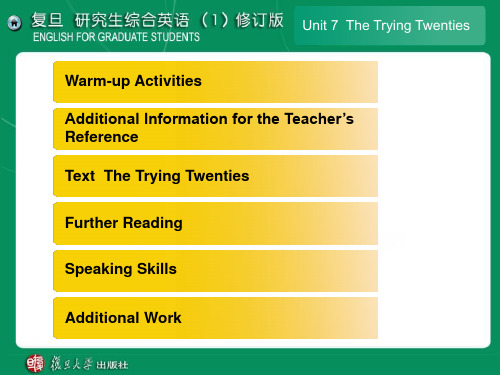
Unit 7 The Trying Twenties
2. How will you describe people in their twenties?
Positive: energetic/incandescent with their energies, impatient to be on their own, eager to find their own way of living in the world, ambitious, brave, curious, adventurous, vivacious, confident, optimistic, cheerful, straightforward Negative: changeable, baffled, confused, lovelorn (sometimes), rash, reckless, immature
Additional Work
Unit 7 The Trying Twenties
Warm-up Activities 1. What does “the trying twenties” mean? Why is the twenties a “trying” period? Here “trying” means straining one’s power of endurance, so the phrase means that the twenties is a period in which people undergo many ordeals that will temper their willpower and make them more mature. Twenty-somethings are presented with numerous tasks which they are not yet equipped to deal with. For example, to prepare for a career, to find a mentor who will guide you through life, to find a mate with whom you will spend your life, etc. These are the things that were once irrelevant, but now have become imminent. In a sense these are the “trials” they need to go through as they are becoming an adult.
研究生学术英语答案Unit-7
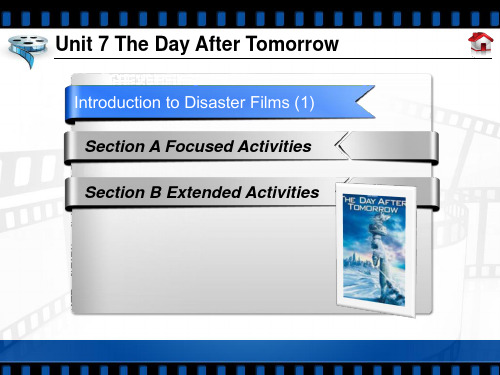
Professor Hall: 7) W__i_th__a_ll_d_u_e_r_e_s_p_e_c_t , Mr. Vice President, the cost of doing nothing could be even higher. Our climate is fragile. 8) _A_t_th_e__r_a_te_ we’re burning fossil fuels and polluting the environment, the ice caps will soon disappear.
Arabian Reporter: I’m 2) c_o_n_f_u_s_e_d . I thought you were talking about global warming, not an ice age.
Section A Part 2 Watching & Listening
Professor Hall: Yes, it is a paradox, but, global warming can 3) t_r_ig_g_e_r a cooling trend. Let me explain. The Northern Hemisphere owes its temperate climate to the North Atlantic current. Heat from the sun arrives at the 4) e_q_u_a_t_o_r and is carried north by the ocean. But, global warming is melting the polar ice caps and 5) d_i_s_ru_p_t_in_g_this flow. Eventually it will shut down, and when that occurs, there goes our warm climate.
研究生英语高级教程unit7译文

参考译文如何应对全球流行病布莱恩•沃什[1]对于墨西哥城这样拥有两千万人口的熙熙攘攘的大都市而言,恢复生机的第一个标志不是公开的宗教仪式,也不是政治集会,而是交通拥堵,这很正常。
为应对甲型H1N1流感的爆发,墨西哥城实施了为期一周的停工停市,终于在五月五日这天重归繁华与喧闹。
猪流感的传播速度已经减缓,这使得墨西哥的政府官员燃起希望,觉得最糟糕的时刻已经过去了。
[2]国际卫生组织的官员也可以稍感放松了。
自从四月底首次出现新型流感病毒报告以来,他们一直处于高度紧张状态。
世界卫生组织和疾病预防控制中心的科学家发现在墨西哥以外鲜有严重或致死的甲型H1N1流感病例,另外也没有足够证据显示疾病会在多数国家持续传播。
[3]那么,世界范围内的关闭学校、边境检测和政府要员召开新闻发布会号召民众勤洗手是大惊小怪吗?很可惜,不是。
正如卫生组织的官员反复强调的,我们现在还处于甲型H1N1流感爆发的初期,而流感病毒的不可预测性是众所周知的。
目前,这种新型流感病毒似乎和普通季节性流感的危险性相差无几,但它可能会在明年冬天以更为致命的方式卷土重来——正如1918年那场造成灾难性后果的大流感一样。
[4]现实情况是,虽然美国和其他国家的卫生部门官员在应对甲型H1N1流感病毒方面进行的广泛合作值得赞扬,但H1N1病毒的出现还只是敲响一个警钟,并不是对我们意志和能力的真正考验。
哥伦比亚大学的美国国家灾难防御中心主任爱尔文•莱德纳尔博士指出:“我们应该把这种新型流感病毒的出现看作是警钟,而不是闹铃。
”[5]在甲型H1N1流感病毒面前,我们这个广泛联系的全球社会对新出现的疾病所显示出的无助暴露无遗。
乘飞机旅行和国际贸易往来使得新型病菌能在不到两周的时间内传播到二十几个国家。
当然,全球化有不利因素也有其优势。
正是全球化使我们能够建立起一个真正意义上的全球疾病监测系统。
全球性流行病的威胁提醒美国人必须对自己老朽过时的医疗卫生系统进行修正。
在传染病爆发的时候,每个人的处境都岌岌可危。
研究生英语听说Unit 7
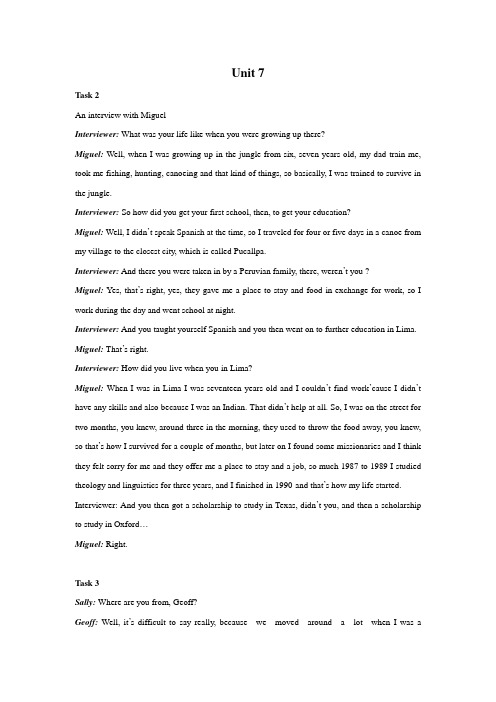
Unit 7Task 2An interview with MiguelInterviewer: What was your life like when you were growing up there?Miguel: Well, when I was growing up in the jungle from six, seven years old, my dad train me, took me fishing, hunting, canoeing and that kind of things, so basically, I was trained to survive in the jungle.Interviewer: So how did you get your first school, then, to get your education?Miguel: Well, I didn’t speak Spanish at the time, so I traveled for four or five days in a canoe from my village to the closest city, which is called Pucallpa.Interviewer: And there you were taken in by a Peruvian family, there, weren’t you ?Miguel: Yes, that’s right, yes, they gave me a place to stay and food in exchange for work, so I work during the day and went school at night.Interviewer: And you taught yourself Spanish and you then went on to further education in Lima. Miguel: That’s right.Interviewer: How did you live when you in Lima?Miguel: When I was in Lima I was seventeen years old and I couldn’t find work’cause I didn’t have any skills and also because I was an Indian. That didn’t help at all. So, I was on the street for two months, you knew, around three in the morning, they used to throw the food away, you knew, so that’s how I survived for a couple of months, but later on I found some missionaries and I think they felt sorry for me and they offer me a place to stay and a job, so much 1987 to 1989 I studied theology and linguistics for three years, and I finished in 1990-and that’s how my life started. Interviewer: And you then got a scholarship to study in Texas, didn’t you, and then a scholarship to study in Oxford…Miguel: Right.Task 3Sally: Where are you from, Geoff?Geoff: Well, it’s difficult to say really, because we moved around a lot when I was akid.Sally: Oh, why was that?Geoff: Well, basically because my parents couldn’t agree where to live! My father wanted to live abroad. He liked warm climates, you see. But my mother preferred Britain.Sally: Oh, I see! Where were you born then?Geoff: I was born in South America, in Peru, but I grew up mostly in England. We left Peru when I was about four years old. My sister Bonnie was two.Sally: Why did you left?Geoff: Well, my grandfather was ill and my mother didn’t want to be so far away from him. So we went to Manchester, in England.Sally: I bet your mum was happy about that.Geoff: yes, but we didn’t stay there very long. My grandfather died and we went to the Far East-to Singapore.Sally: And how long did you stay there?Geoff: Oh, quite a long time for us-nearly five years. But then my dad lost his job, because his company closed down.Sally: That was unlucky.Geoff: Yes, it was, because we all liked it there. Anyway, we moved back to Britain, because my father find a job in Scotland, but…Sally: He didn’t like it, Right?Geoff: Right. It was too far north-too cold, you see. So after about six months we moved down to South Landon. I was about ten by this time.Sally: Good Heavens! And how long did you stay there?Geoff: Oh, that was the last stop. I started secondary school, you see, so we stay there till I left school and went to university. But soon after that, my parents moved.Sally: Where did they go this time?Geoff: Well, my sister got married and went to live in Australia. So my parents followed. Lots of sunshine there.Sally: And where are they now?Geoff: Oh, they’re still there.Sally: And when did you come to Canada?Geoff: Oh, about two years ago, when I got a place at the university. But, anyway, that’s my life story. What about you? Where are you from?Sally: Well, my life seems a bit boring after that. I was born in…Task 5Presenter: In this week’s edition of It was a normal day we hear stories from Robin, Katherine and David. They tell us about normal days which became very unusual days. First Robin’s story. Robin: It was nearly ten years ago, so I was about 22. I was working as a builder at the time and I was also the singer with a band in my free time. Anyway, we were building some house near Farnham in Surrey. It was about half past ten in the morning and most of the other men were having their tea break. They were listening to the radio. I was working on the roof of one of the house. Well, as I said, I sang with a band in my free time and we’d made a record, called Wild One. None of the other guys at work knew about it. Anyway, it came on the radio. The man painting the windows said, “Great. I think this record’s stunning. If it doesn’t reach number one, I’ll eat my paint brush.” I felt very excited when he said that, but I didn’t say anything. But then when the record finished the DJ came on and said, “There, straight into the charts this week at number 11 is Wild One.”Presenter: And what did you do?Robin: Well, that was enough for me. I climbed down the ladder. I gave my bag of tools to the other guys and said, “Here, you can have these. I’m off.” And I left. Two weeks later our record hit number one and we had several more hits after that.Presenter: So a normal day became the start of an exciting new life for Robin. For Katherine it was also the start of a new life, but…Katherine:Oh yea, it was a normal day-a very normal day. That was the problem. It was two years ago now-about eight o’clock in the evening.Presenter: What were you doing?Katherine: We were sitting in the living room. My husband was sitting in an armchair. He was reading the paper, as he always did. I was sitting on the sofa. I was knitting. Our daughter was expecting a baby, you see-our first grandchild-and I was knitting a little a little cardigan for it.There was a quiz show on the TV. It was Strike it Lucky. Isn’t it interesting how you remember these details? But we weren’t really watching it.Presenter: And what happened?Katherine: Well, as I said, we were just having a normal evening at home, when suddenly my husband put down his newspaper and said, “I’m sorry, but I can’t stand this any longer. I’m totally bored with our marriage. I don’t love you and I want a divorce.”Presenter: How did you feel?Katherine: I didn’t do anything. It’s funny but I just carried on with the cardigan. But my husband went upstairs and packed a suitcase. When he came downstairs I was still knitting. I just couldn’t believe what was happening. He said, “I’m leaving,”and I said, “Would you like a cup of tea first?” I don’t know why I said that. It just came out automatically. Anyway, he just said, “Oh my God! Is that all you can say?” I wanted to talk about it, but he wasn’t interested. He just picked up his suitcase and left.Presenter: Finally we came to David’s story. David is a bank manager.David: Oh yea, I can remember it as if it was yesterday. I was at work at the time-at the bank. I was having a meeting with my staff. We were all sitting around the big table in my office. It was a rather boring meeting, but most meeting are, I suppose. Anyway, while Sarah Harvey, the assistant manager, was speaking, my secretary came in and said, “There’s a phone call for you.”Well, normally me secretary doesn’t interrupt meetings for phone calls. She takes a message. So I was surprised when she came in. “It’s your wife,” she said. “She said it’s urgent,” I was rather worried at this. My wife doesn’t panic easily.Presenter: What did you do?David: I went into the secretary’s office and I picked up the phone. My wife answered, but immediately a man’s voice came on the line. He said, “We’ve got your life and children here. Listen and follow my instructions and they’ll be all right.”I was shocked, but I listened to the instructions. “In ten minutes’ time,” he said, “a man in a green jumper will came into your bank. Give him all the money from the safe. When he telephones me, we’ll release your family.” And then he put the phone down.Presenter: What did you do?David: Well, I just did as he said. I had no choice. It was very worrying at the time, but everyonewas all right in the end. The police found some of the money, but they never caught the men.Task 7Speaker 1I remember hearing footsteps in the street coming up behind me. I feel quite anxious, and stressed.I was sure that someone was following me. Then suddenly someone tapped me on the shoulder, I turned round, terrified, and there was a young man looking at me. “You’re gorgeous!” He said and put a piece of paper and a red rose into my hand. Then he ran off down the street. He’d written his name and phone number on the piece of paper. I had a boyfriend at the time so I throw the number away. Now I can’t even remember what he looked like.Speaker 2I was reading a magazine in the kitchen and listing to some music when the telephone rang. My girlfriend answered it. I couldn’t hear what she was saying, but then she suddenly ran into the kitchen and shouted, “You’ve won a motorcycle!” I’d entered a competition months earlier. I had to answer some really easy questions-I can’t remember what they were now. I was absolutely thrilled-I’d never won anything before.Speaker 3I remember that my sister and I weren’t allowed to go and see Mum in the hospital. It was against hospital regulations but I can’t remember why. Anyway, we were really disappointed but Dad brought us a photo of little Michael so we could see him. We were so excited when Mum finally brought him home. We kept arguing about who would get to help Dad bath him and put him to bed. It’s incredible to think that he was ever that small. He’s almost two meters tall now.Speaker 4I came home from work very late and immediately I could see that Nick look annoyed about something. When I asked him if anything was the matter he just said “No” and walk out of the room. He’d cooked this really amazing meal…it must have taken hours and there were flowers and candles. “What’s the special occasion?”I asked. “Our fifth wedding anniversary”, he said.I’ve never felt so terrible in my life. Even though he’d mentioned it a few days before I’d completely forgotten about it.。
Unit7研究生英语,熟谙
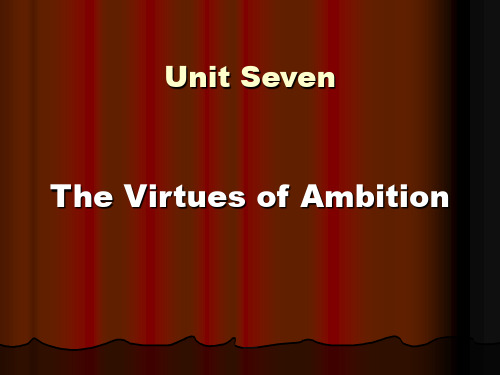
Ardent is immediately regarded as a
please explain:
be ambitious for the public good, for the alleviation of suffering, for the enlightenment of mankind,… strive to be successful, rich, powerful, etc., in order to help the public, to ease human suffering, to enlighten mankind...
paraphrase
What life does with our dreams and expectations cannot be predicted. What will actually happen to our dreams and expectations during our lives cannot be predicted. do with: get on with; have a connection with
values, your philosophy, etc.
Word study
give oneself / someone away: to betray oneself /someone; to tell people sth. secret e.g. The swindler(欺诈者) gave himself away when he was asked to establish his identity. She really likes him and thinks no one knows, but the look on her face when mentioned his name gave her away.
研究生综合英语Unit7
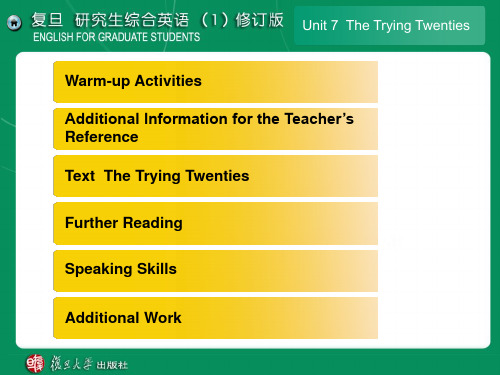
Unit 7 The Trying Twenties
Warm-up Activities 1. What does “the trying twenties” mean? Why is the twenties a “trying” period? Here “trying” means straining one’s power of endurance, so the phrase means that the twenties is a period in which people undergo many ordeals that will temper their willpower and make them more mature. Twenty-somethings are presented with numerous tasks which they are not yet equipped to deal with. For example, to prepare for a career, to find a mentor who will guide you through life, to find a mate with whom you will spend your life, etc. These are the things that were once irrelevant, but now have become imminent. In a sense these are the “trials” they need to go through as they are becoming an adult.
Unit 7 The Trying Twenties
复旦大学,研究生综合英语1、2册单词

Unit 1 --------mirage [mi'rɑ:ʒ] n. 海市蜃楼;幻想,妄想illusion [i'lu:ʒən] n. 幻觉,错觉;错误的观念或信仰con [kɒn] n. 反对票;反对论prep. 以…vt. 精读;默记adj. 欺诈的adv. 反面地infallible [in'fæləbl] adj. 绝无错误的, 绝对可靠的squarely ['skwɛəli] adv. 成方形地, 成直角地, 直接地, 坚定地prospect ['prɔspekt] n.希望,前景,景色v.勘探,寻找rip [rip] vt.撕裂,扯开n.裂口,裂缝,撕裂flabby ['flæbi] adj. 软弱的, 没气力的, 不稳的conversely adv. 相反地seedy ['si:di] adj. 多种子的;结籽的;破烂的;没精打采的;下流的greasy ['gri:zi] adj. 油腻的;含脂肪多的;谄媚的streetwalker n.娼妓;拉客妓女call girl n. 电话应召女郎aforementioned [ə'fɔ:'menʃənd] adj. 上述的;前面提及的devious ['di:viəs] adj. 偏僻的;弯曲的;不光明正大的hitchhiker ['hitʃhaikə] n. 搭便车的旅行者, 短篇广告, 顺便插入的广告snap [snæp] adj.突然的, 匆忙的erroneous [i'rəuniəs] adj. 错误的, 不正确的devastating ['devəsteitiŋ] adj.毁灭性的, 破坏性的, 惊人的, 压倒性的, 有魅力的v. 破坏granted adv. 假定,假设eloquent ['eləkwənt] adj. 雄辩的, 有口才的, 动人的magnetic [mæg'netik] adj.有磁性的, 有吸引力的romp [rɔmp] vi. 嬉闹玩笑, 欢快地迅速奔跑vi. 轻易地取得胜利unassuming ['ʌnə'sju:miŋ] adj. 谦逊的, 不装腔作势的glib [glib] adj. 能说善道的, (说话)不假思索的, 轻易随口的extroverted adj. 性格外向的;外向性的;喜社交的flamboyant [flæm'bɔiənt] adj.艳丽的,炫耀的turnover n. 翻覆;[贸易] 营业额;流通量;半圆卷饼;失误adj. 翻过来的;可翻转的unwarranted ['ʌn'wɔrəntid] adj. 无根据的, 未经授权的, 无保证的attorney n. 律师;代理人root canal n. 牙根管, 牙根管填充手术sedan [si'dæn] n. (美)厢式小轿车, 单舱汽艇, 轿子window-dressing n. 装门面措施;弄虚作假vt. 布置橱窗;装饰门面rapport [ræ'pɔ:t] n.关系, 亲善, 一致in quest for 追求what about 怎么样;(对于)…怎么样stem from源于, 来自于take to 喜欢;走向;开始从事count on ['kauntɔn] 依靠, 指望Unit 5 ---------mount [maunt] v.登上,爬上, 装上, 上升en route 在途中ultimatum [ˌʌlti'meitəm] n. 最后通牒chronic adj. 慢性的;长期的;习惯性的tardiness ['tɑ:dinis] n. 缓慢, 迟延clamp [klæmp] vt.夹住, 强加, 压制riot ['raiət] n.暴乱, 骚乱, 喧闹Escalate vi. 逐步增强;逐步升高squabble ['skwɔbl] n. 争论, 口角airborne ['ɛəbɔ:n] adj.空运的, 空中传播的, 起飞后在飞行中intone [in'təun] v.吟咏,吟诵enlist [in'list] vt.征募, 使入伍,获得...支持charity ['tʃæriti] n.慈善, 宽厚, 慈善机关(团体), 仁慈drive n. 运动;宣传活动de rigueure adj. 礼节需要的;社交礼仪上必要的draft [dræft] n.草稿, 草图, 汇票, 征兵vt.起草, 征兵, 选秀tightrope ['taitrəup] n. 拉紧的绳索, 极其危险的处境enunciate [i'nʌnsieit] v. 发音, (清楚地)表达one-liner n. 小笑话,俏皮话truculent ['trʌkjulənt] adj. 野蛮的, 粗野的, 残酷的buttress ['bʌtris] n. 扶墙, 拱壁vt. 支持caricature ['kærikətʃuə] n.讽刺画, 讽刺, 歪曲, 笨拙的模仿guise [gaiz] n. 装束, 外观, 伪装, 借口gag n. 塞口物;讨论终结;箝制言论vt. 塞住…的口;钳制…的言论;使窒息vi. 插科打诨;窒息;作呕n. (Gag)人名;(英)加格suffice vt. 使满足;足够…用;合格vi. 足够;有能力blitz [blits] n. 闪击战bolster ['bəulstə] vt.支持, 鼓励foster ['fɔstə] vt.领养, 培养, 促进, 鼓励, 抱有(希望等)citadel ['sitədl] n. 城堡, 要塞aloofness [ə'lu:fnis] n.冷漠;远离anecdote ['ænikdəut] n.轶事, 奇闻contagion [kən'teidʒən] n. 传染病, 接触传染, 蔓延defiant [di'faiənt] adj. 挑衅的, 目中无人protocol n. 协议;草案;礼仪implore v. 恳求,哀求ladle ['leidl] vt. 不分对象予以赠送;以杓舀取Unit 6 --------theologian n 神学bioethicist n 生物医学permeate vt 渗透op-ed adj 社论对页版mammary adj 乳腺的nascent adj 开始存在的atheist n 无神论者inundate vt 应接不暇pharmaceutical adj 制药的insulin n 胰岛素essentialism n 本质先于存在论reiterate vt 重申;反复的做uterine adj 子宫的transfix vt 使惊呆determinism n 决定论ply vt 使用;从事某行业juggernaut n 重型卡车mandate n 任期onslaught n 猛攻;突击docile adj 温顺的;驯服的;容易教的a host of 大量的grapple with v 扭打;努力克服be entitle to 有权;有……的资格walk of life 社会阶层Unit 8 --------populate ['pɔpjuleit] v. 构成人口, 居住于deceptive [di'septiv] adj.骗人的, 虚伪的,诈欺的masculine ['mæskjulin] adj.男性的, 有男子气概的, 阳性的bracket ['brækit] n.支架, 托架, 括弧falsify ['fɔ:lsifai] vt.伪造, 歪曲enslave [in'sleiv] vt. 使做奴隶, 使处于奴役的状态cog [kɔg] n. 齿oversight ['əuvəsait] n. 疏忽, 失察, 监管, 看管spur [spə:] vt.刺激, 鞭策,促进flirt [flə:t] vi.调情, 玩弄, 掠过,轻率对待demotion [di'məuʃən] n.降级,降职,降等banter ['bæntə]n/ v. 戏弄, 开玩笑scarlet ['skɑ:lit] n/adj.猩红, 绯红色, 红衣dissect [di'sekt] v. 解剖, 切细, 仔细研究, 详细分析bluff [blʌf] v/n. 虚张声势abysmally [ə'bizməli] adv. 深不可测地, 极坏地bait [beit] n.饵, 引诱vt.以饵引诱, 放饵, 逗弄magnate ['mægneit] n. 巨头orchestra ['ɔ:kistrə] n.管弦乐队zenith ['zi:niθ] n. 顶点, 天顶, 全盛becomingly adj. 合适的, 适宜的; 有吸引力的; 好看的prima ballerina ['pri:məˌbælə'rinə]首席女舞者;芭蕾舞团的首席女演员mastermind n.才华横溢的人; 策划者; 智囊v.指导, 策划, 主持obliterate [ə'blitəreit] v. 涂去, 擦去, 删除to all intents 所有意图at every turn adv. 事事;到处as opposed to 而不是mark time 停顿不前at stake 危如累卵;处于危险中;在紧要关头come by vt. 得到;从旁走过exert oneself 努力;尽力in the nick of time 及时;恰好二、Unit 2--------cognac n. 法国白兰地perspicacious adj. 有洞察力的;聪颖的;敏锐的betoken vt. 预示;表示nicety n. 精密;美好;细节;拘泥细节ritualistic adj. 仪式的;固守仪式的;惯例的explicitly adv. 明确地;明白地one-up vt. 领先于……,胜过canoe n. 独木舟;轻舟reciprocity n. 相互作用(复数reciprocities);相互性;互惠主义rhetoric n. 修辞,修辞学;华丽的词藻benefactor n. 恩人;捐助者;施主hooker n. 妓女;渔船frill n. 装饰;褶边vt. 折成皱边vi. 起边皱frivolous adj. 无聊的;轻佻的;琐碎的wont n. 习惯;惯常活动prone adj. 俯卧的;有…倾向的,易于…的cliche n. 陈词滥调;[印刷] 铅版;陈腐思想adj. 陈腐的fabulous adj. 难以置信的;传说的,寓言中的;极好的tacky adj. 俗气的;发黏的;缺乏教养或风度的ego n. 自我;自负;自我意识pamper vt. 纵容;使…过量;给…吃得过多n. (Pamper)人名;(德)潘佩尔altruism n. 利他;利他主义altruist n. 爱他主义者;利他主义者dispense vi. 免除,豁免vt. 分配,分发;免除;执行largess n. 慷慨的赠予;赠品philanthropic adj. 博爱的;仁慈的donee n. 受赠者,[经] 受赠人callow adj. 年轻而无经验的;羽毛未丰的fast n. 斋戒;绝食austere adj. 严峻的;简朴的;苦行的;无装饰的charisma n. 魅力;神授的能力;非凡的领导力dime n. 一角硬币donor n. 捐赠者;供者;赠送人adj. 捐献的;经人工授精出生的chisel n. 凿子vt. 雕,刻;凿;欺骗vi. 雕,刻;凿;欺骗cynic n. 愤世嫉俗者;犬儒学派的人ironist n. 讽刺家;讽刺作家neurosis n. [心理] 神经症;神经衰弱症conduit n. [电] 导管;沟渠;导水管out of proportion 不成比例get down to 开始认真考虑;着手处理paper over 用纸遮盖;糊上纸;掩盖;掩饰;粉饰do a good turn 做好事wind up 结束;使紧张;卷起;(非正式)忽悠某人(wind sb up)measure up 合格;符合标准Unit4--------euthanasia n. 安乐死;安乐死术cessation n. 停止;中止;中断humanitarian n. 人道主义者;慈善家;博爱主义者;基督凡人论者adj. 人道主义的;博爱的;基督凡人论的syndrome n. [临床] 综合征;综合症状;并发症状;校验子;并发位pediatric adj. 小儿科的congenital adj. 先天的,天生的;天赋的intestinal adj. 肠的obstruction n. 障碍;阻碍;妨碍scalpel n. 解剖刀;外科手术刀dehydration n. 脱水patently adv. 明显地;公然地;明白地prohibitively adv. 禁止地;过高地;过分地thrash n. 打谷;逆风浪行进;踢水动作vt. 打;使逆行vi. 打谷;白忙;猛烈摆动deranged adj. 疯狂的;精神错乱的grotesque n. 奇异风格;怪异的东西adj. 奇形怪状的;奇怪的;可笑的perversion n. 反常;颠倒;曲解;误用;堕落conflate vt. 合并;异文合并appraisal n. 评价;估价(尤指估价财产,以便征税);估计sadistic adj. 虐待狂的;残酷成性的Unit 5--------scepticism n. 怀疑;怀疑论;怀疑主义fallacy n. 谬论,谬误hitherto adv. 迄今;至今totter n. 蹒跚的步子vi. 蹒跚;踉跄arduous adj. 努力的;费力的;险峻的toil n. 辛苦;苦工;网;圈套vt. 费力地做;使…过度劳累vi. 辛苦工作;艰难地行进indubitable adj. 不容置疑的;明确的folly n. 愚蠢;荒唐事;讽刺剧exterminate vt. 消灭;根除sober adj. 冷静的,清醒的;未醉的vt. 使严肃;使醒酒,使清醒fatalistically 宿命论ascertain vt. 确定;查明;探知pestilence n. 瘟疫(尤指鼠疫);有害的事物creed n. 信条,教义discord n. 不和;不调和;嘈杂声vi. 不一致;刺耳epoch n. [地质] 世;新纪元;新时代;时间上的一点tyranny n. 暴政;专横;严酷;残暴的行为(需用复数)interlude n. 插曲;穿插;幕间节目;[数] 插算potent adj. 有效的;强有力的,有权势的;有说服力的gospel n. 真理;信条wholeheartedness n. 全神贯注;全心全意metaphor n. 暗喻,隐喻;比喻说法preclude vt. 排除;妨碍;阻止synthesis n. 综合,[化学] 合成;综合体elude vt. 逃避,躲避grimly adv. 可怕地;冷酷地;严格地garb n. 服装;装束;打扮vt. 装扮;穿衣treachery n. 背叛;变节;背叛行为perpetual adj. 永久的;不断的;四季开花的;无期限的allegiance n. 效忠,忠诚;忠贞mundane adj. 世俗的,平凡的;世界的,宇宙的Unit 7--------misty-eyed adj. 含泪的;感伤的quip n. 妙语;嘲弄;讽刺语vi. 嘲弄;讥讽vt. 嘲弄snob n. 势利小人,势利眼;假内行chariot n. 二轮战车vi. 乘战车;驾驭战车arbiter n. [法] 仲裁者;裁决人enticement n. 诱惑;怂恿;引诱物;吸引力nude adj. 裸的,裸体的;无装饰的;与生俱有的buck n. (美)钱,元;雄鹿;纨绔子弟;年轻的印第安人或黑drachma n. 古希腊的重量单位;古希腊的银币名sprint n. 冲刺;短跑vt. 全速奔跑vi. 冲刺,全速跑absolve vt. 免除;赦免;宣告…无罪ferocious adj. 残忍的;惊人的besmirch vt. 弄污;损害;诽谤iconoclastic adj. 打破旧习的;偶像破坏的anecdote n. 轶事;奇闻;秘史nonetheless conj. 尽管如此,但是shenanigan n. 恶作剧;诡计fortify vt. 加强;增强;(酒)的酒精含量;设防于vi. 筑防御工事swig n. 痛饮,大喝;牛饮ominous adj. 预兆的;不吉利的stimulant n. [药] 兴奋剂;刺激物;酒精饮料strychnine n. 士的宁;番木鳖碱tape n. 胶带;磁带;带子;卷尺vt. 录音;用带子捆扎;用胶布把…封住vi. 用磁带录音pentathlon n. 五项运动;五项全能运动epee n. 重剑;尖剑术hormone n. [生理] 激素,荷尔蒙conjecture n. 推测;猜想impersonator n. 演员;模拟艺人bleak adj. 阴冷的;荒凉的,无遮蔽的;黯淡的,无希望的;冷酷的;单调的skulduggery n. 作假;欺诈;诡计frailty n. 虚弱;弱点;意志薄弱roll around 流逝;周而复始fair play 公平竞争;公平比赛;平等对待by fair means or foul 不择手段地take a dive 假装被击倒jump the gun 偷跑;行动过早;未听发令枪就起跑neck to neck 并驾齐驱fork over 付出hail from (车、船)来自;(人)出生于in honor 为了纪念;向…表示敬意fair and square 光明正大地;诚实地under one’s own steam 下一个的蒸汽cramp up 抽筋go off 离开;进行;变质;睡去。
研究生英语

How to summarize an article?
• Step one: • take a few minutes to preview the work. • 1. Title • 2. Subtitle • 3. First and last several paragraphs
How to summarize an article?
English
• as a “world language”, the lingua franca (通用语)of the modern era.
How to learn English well?
• Motivation: • Developing a passion for learning English
English for Graduate Students 研究生英语
An Introduction
About me
• 卢玉玲
• yllu@ • 13901663197
Course description
• Textbook • 《研究生英语》 • 曾建彬,卢玉玲主编 • 复旦大学出版社
• Step two: • Read the whole article. Do not slow down or turn back. Mark main points and key supporting details.
How to summarize an article?
• • • • Step three: Reread the important areas. Step four: Take notes on the material
structure
研究生英语综合教程英语原文Unit7
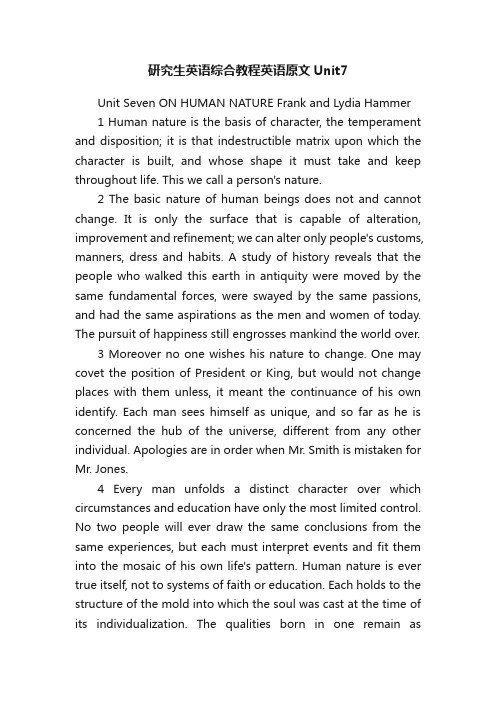
研究生英语综合教程英语原文Unit7Unit Seven ON HUMAN NATURE Frank and Lydia Hammer1 Human nature is the basis of character, the temperament and disposition; it is that indestructible matrix upon which the character is built, and whose shape it must take and keep throughout life. This we call a person's nature.2 The basic nature of human beings does not and cannot change. It is only the surface that is capable of alteration, improvement and refinement; we can alter only people's customs, manners, dress and habits. A study of history reveals that the people who walked this earth in antiquity were moved by the same fundamental forces, were swayed by the same passions, and had the same aspirations as the men and women of today. The pursuit of happiness still engrosses mankind the world over.3 Moreover no one wishes his nature to change. One may covet the position of President or King, but would not change places with them unless, it meant the continuance of his own identify. Each man sees himself as unique, and so far as he is concerned the hub of the universe, different from any other individual. Apologies are in order when Mr. Smith is mistaken for Mr. Jones.4 Every man unfolds a distinct character over which circumstances and education have only the most limited control. No two people will ever draw the same conclusions from the same experiences, but each must interpret events and fit them into the mosaic of his own life's pattern. Human nature is ever true itself, not to systems of faith or education. Each holds to the structure of the mold into which the soul was cast at the time of its individualization. The qualities born in one remain aspotentials whether they have a chance to develop or not. Under pressure, or change of interest, they can partially or wholly disappear from view, tor considerable periods of time; but nothing can permanently modify them, nothing can obliterate them.5 The constancy of human nature is proverbial, as no one believes that a man can fundamentally change his nature. This is why it is so difficult for one who has acquired an unsavory reputation to re-establish himself in public confidence. People know from experience that an individual who in one year displays knavish characteristics- seldom in the next becomes any different. Nor does a thief become a trustworthy employee, or a miser a philanthropist. Nor does a man change and become a liar, coward or traitor at fifty or sixty; if he is one then, he has been one ever since his character was formed. Big criminals are first little criminals, just as giant oaks are first little acorns.6 Although man is potentially perfect he is far from being actually so. If he were actually perfect there would be nothing for preachers and humanitarians to do; no use for churches, schools, courts and prisons. Therefore while it is impossible to change human nature, it can be studied, controlled and directed, and this should be the supreme function of our religious, educational and social institutions.7 Man is perfect as a seed is perfect, germinally. The spirit is perfect, but when it inhabits human structures, it participates in the imperfections of the later; and during its association with matter takes on the mortal weakness, desires and limitations. But the spirit, the inner man, remains untouched and undefiled by evil. Only the outer man- the personality and the physical body- becomes imperfect, due to ignorance, wrong thinking andviolation of the law of being. The outerman, too, was originally perfect, but man has so desecrated and abused it that today it is a far cry from the original model.8 Man's majesty and nobility are taken for granted, although his faults and weaknesses are constantly paraded before our eyes. Only when behavior deviates from the normal does it attract attention. The good neighbor, the conscientious citizen, the kind father and faithful husband pass unnoticed. But the murderer, robber or wife beater is singled out for ublicity, because such conduct is unusual.9 Man's inherent goodness, moreover, is revealed by his countless acts of heroism, unselfishness and sacrifice. Daily one reads of men saving others at the peril of their own lives. One plunges into the surf and rescues a swimmer from drowning; another dashes into a burning house and carries a stranger to safety; others snatch a child from the wheels of death; many give their blood so that others may live. Countless unnamed and unrecorded men have given their lives for their fellowmen, not only on the battlefront but on the home- front as well.10Human nature does not and cannot change but unfolds its inherent pattern. Man has a nature and its laws can be known. We can only endeavor to understand man as he is.。
复旦研究生英语Unit Seven
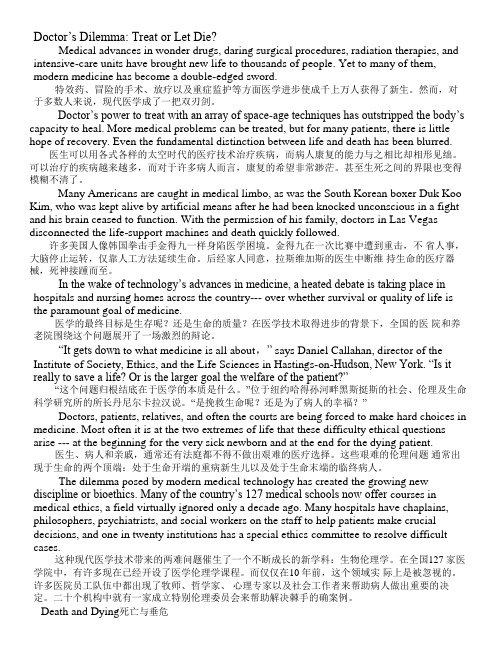
Doctor’s Dilemma: Treat or Let Die?Medical advances in wonder drugs, daring surgical procedures, radiation therapies, and intensive-care units have brought new life to thousands of people. Yet to many of them, modern medicine has become a double-edged sword.特效药、冒险的手术、放疗以及重症监护等方面医学进步使成千上万人获得了新生。
然而,对于多数人来说,现代医学成了一把双刃剑。
Doctor’s power to treat with an array of space-age techniques has outstripped the body’s capacity to heal. More medical problems can be treated, but for many patients, there is little hope of recovery. Even the fundamental distinction between life and death has been blurred.医生可以用各式各样的太空时代的医疗技术治疗疾病,而病人康复的能力与之相比却相形见绌。
可以治疗的疾病越来越多,而对于许多病人而言,康复的希望非常渺茫。
甚至生死之间的界限也变得模糊不清了。
Many Americans are caught in medical limbo, as was the South Korean boxer Duk Koo Kim, who was kept alive by artificial means after he had been knocked unconscious in a fight and his brain ceased to function. With the permission of his family, doctors in Las Vegas disconnected the life-support machines and death quickly followed.许多美国人像韩国拳击手金得九一样身陷医学困境。
复复旦研究生综合英语1-Unit7
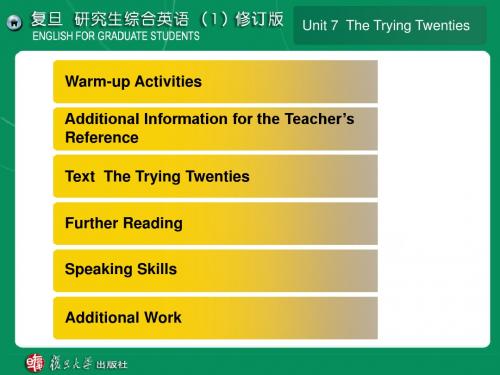
Unit 7 The Trying Twenties
3. Illusions are usually considered as negative. Can you think of how illusions can sometimes be beneficial for people in their twenties? People in their twenties are faced with problems never met before. They don’t yet have enough experience and resources to deal with them, but they usually have no one to turn to and they don’t like to look for help either. In times like this, illusions take away the fear inside a person and replace it with confidence and excitement. Since all they have is they themselves, the belief that their intelligence and willpower conquers all propels them forward. It is in the attempt to solve the problems that they mature.
本人如有侵犯作者权益请作者联系官方或本人本人将立即删除
Unit 7 The Trying Twenties
Warm-up Activities Additional lnformation for the Teacher’s Reference Text The Trying Twenties Further Reading
最新研究生英语综合教程Unit 7
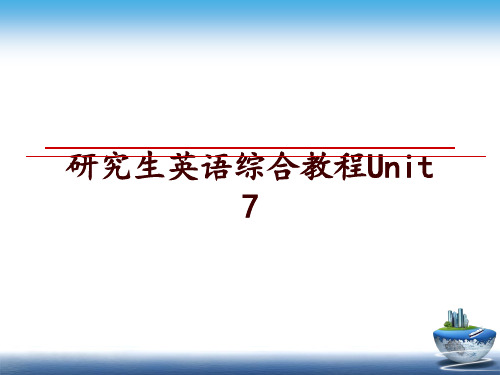
Reading Focus – Detailed Information
Task 2 Choose the sentence that best expresses the meaning of the sentence from the text. (P198)
Key: 1A 2 D 3 C 4 B 5 A 2 C 6 7D 8 B
Background Information
Watch a video clip from the American hit TV drama series Prison Break, and discuss with the group: Michael Scofield said at the end of the clip: “The man you’re talking about died the moment I stepped into these walls.” Do you think Sara, the prison doctor, would take his word for it?
living environment or something else that shaped his behavior?
Starting out
Sad Movies
Listen to “Sad Movies”, a song which tells a sentimental story, and do the following tasks:
Reading Focus – Global Understanding
Body
_C_h_a_r_a_c_t_e_ri_s_ti_c_s_ of human nature
研究生英语课件Unit7
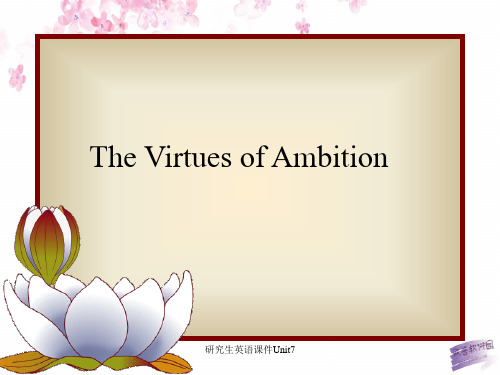
Lines 5-7, para 1
• Ardent immediately assumes a heat incommensurate with good sense and stability, and rank, fame, and power have come under fairly heavy attack for at least a century.
研究生英语课件Unit7
The structure of the text
• Part 1 (para.1-3): None of this seems a sufficient cause for driving ambition under the counter.
• Part 2 ( para.4-5):What is the worst that can be said about ambition.
The Virtues of Ambition
研究生英语课件Unit7
Introduction to the Author
• Joseph Epstein(1937-), noted essayist,short story author and novelist, was born in Chicago and grew up in Rogers Park. He then attended the University of Chicago and is now a promineng member of the literature faculty at Northwestern University.
研究生英语课件Unit7
• Be commensurate with: match sth. in size, quality, or length of time
- 1、下载文档前请自行甄别文档内容的完整性,平台不提供额外的编辑、内容补充、找答案等附加服务。
- 2、"仅部分预览"的文档,不可在线预览部分如存在完整性等问题,可反馈申请退款(可完整预览的文档不适用该条件!)。
- 3、如文档侵犯您的权益,请联系客服反馈,我们会尽快为您处理(人工客服工作时间:9:00-18:30)。
Doctor’s Dilemma: Treat or Let Die?Medical advances in wonder drugs, daring surgical procedures, radiation therapies, and intensive-care units have brought new life to thousands of people. Yet to many of them, modern medicine has become a double-edged sword.特效药、冒险的手术、放疗以及重症监护等方面医学进步使成千上万人获得了新生。
然而,对于多数人来说,现代医学成了一把双刃剑。
Doctor’s power to treat with an array of space-age techniques has outstripped the body’s capacity to heal. More medical problems can be treated, but for many patients, there is little hope of recovery. Even the fundamental distinction between life and death has been blurred.医生可以用各式各样的太空时代的医疗技术治疗疾病,而病人康复的能力与之相比却相形见绌。
可以治疗的疾病越来越多,而对于许多病人而言,康复的希望非常渺茫。
甚至生死之间的界限也变得模糊不清了。
Many Americans are caught in medical limbo, as was the South Korean boxer Duk Koo Kim, who was kept alive by artificial means after he had been knocked unconscious in a fight and his brain ceased to function. With the permission of his family, doctors in Las Vegas disconnected the life-support machines and death quickly followed.许多美国人像韩国拳击手金得九一样身陷医学困境。
金得九在一次比赛中遭到重击,不省人事,大脑停止运转,仅靠人工方法延续生命。
后经家人同意,拉斯维加斯的医生中断维持生命的医疗器械,死神接踵而至。
In the wake of technology’s advances in medicine, a heated debate is taking place in hospitals and nursing homes across the country--- over whether survival or quality of life isthe paramount goal of medicine.医学的最终目标是生存呢?还是生命的质量?在医学技术取得进步的背景下,全国的医院和养老院围绕这个问题展开了一场激烈的辩论。
“It gets down to what medicine is all about,” says Daniel Callahan, director of the Institute of Society, Ethics, and the Life Sciences in Hastings-on-Hudson, New York. “Is it really to save a life? Or is the larger goal the welfare of the patient?”“这个问题归根结底在于医学的本质是什么。
”位于纽约哈得孙河畔黑斯挺斯的社会、伦理及生命科学研究所的所长丹尼尔卡拉汉说。
“是挽救生命呢?还是为了病人的幸福?”Doctors, patients, relatives, and often the courts are being forced to make hard choices in medicine. Most often it is at the two extremes of life that these difficulty ethical questions arise --- at the beginning for the very sick newborn and at the end for the dying patient.医生、病人和亲戚,通常还有法庭都不得不做出艰难的医疗选择。
这些艰难的伦理问题通常出现于生命的两个顶端:处于生命开端的重病新生儿以及处于生命末端的临终病人。
The dilemma posed by modern medical technology has created the growing new discipline or bioethics. Many of the country’s 127 medical schools now offer courses in medical ethics, a field virtually ignored only a decade ago. Many hospitals have chaplains, philosophers, psychiatrists, and social workers on the staff to help patients make crucial decisions, and one in twenty institutions has a special ethics committee to resolve difficult cases.这种现代医学技术带来的两难问题催生了一个不断成长的新学科:生物伦理学。
在全国127 家医学院中,有许多现在已经开设了医学伦理学课程。
而仅仅在10 年前,这个领域实际上是被忽视的。
许多医院员工队伍中都出现了牧师、哲学家、心理专家以及社会工作者来帮助病人做出重要的决定。
二十个机构中就有一家成立特别伦理委员会来帮助解决棘手的确案例。
Death and Dying死亡与垂危Of all the patients in intensive-care units who are at risk of dying, some 20 percent present difficult ethical choices--- whether to keep trying to save the life or to pull back andlet the patient die. In many units, decisions regarding life-sustaining care are made about three times a week.在所有重症监护病房的生命垂危的病人中,大约有20% 需要艰难的伦理抉择:是继续挽救生命呢?还是放手不管听天由命?在癌症病房,每周涉及到生死抉择的病例多达三次。
Even the definition of death has been changed. Now that the heart-lung machine can take over the functions of breathing and pumping blood, death no longer always comes with the patient’s “last gasp” or when the heart stops beating. Thirty-one states and the District of Columbia have passed brain-death statutes that identify death as when the whole brain ceases to function.就连死亡的定义都已经发生了变化。
由于人工心肺机可以取代心肺的呼吸和泵血功能,因而死亡也不再是“最后一口气”或心脏停止跳动。
三十一个州和哥伦比亚特区已经通过脑死34超过12 个州承认“前遗嘱”。
More than a dozen states recognize “living wills” in which the patients leave instructions to doctors not to prolong life by feeding them intravenously or by other methods if their illness becomes hopeless. A survey of California doctors showed that 20 to 30 percent were following instructions of such wills. Meanwhile, the hospice movement, with its emphasis on providing comfort --- not cure --- to the dying patient, has gained momentum in many areas.病人“生前遗嘱”要求医生在疾病治愈无望的情况下不要通过静脉注射或其他方法延长生命。
1979 年对加利福尼亚的医生所做的调查显示,当年有20%到 30%的医生遵从了病人的生前遗嘱。
与此同时,一项强调为临终病人提供安适生活而不是医疗服务的临终安养运动在许多地区得到了蓬勃发展。
Despite progress in society’s understanding of death and dying, theory issues remain. Example: A woman, 87, afflicted by the nervous-system disorder of Parkinson’s disease, has a massive stroke and is found unconscious by her family. Their choices are to put her in a nursing home until she dies or to send her to a medical center for diagnosis and possible treatment. The family opts for a teaching hospital in New York city. Tests show the woman’s stroke resulted from a blood clot that is curable with surgery. After the operation, she says to her family: “Why did you bring me back to this agony?” Her health continues to worsen, and two years later she dies.尽管社会对于死亡及生命垂危的理解取得了巨大进步,但是棘手的问题仍然迟迟不能解决。
